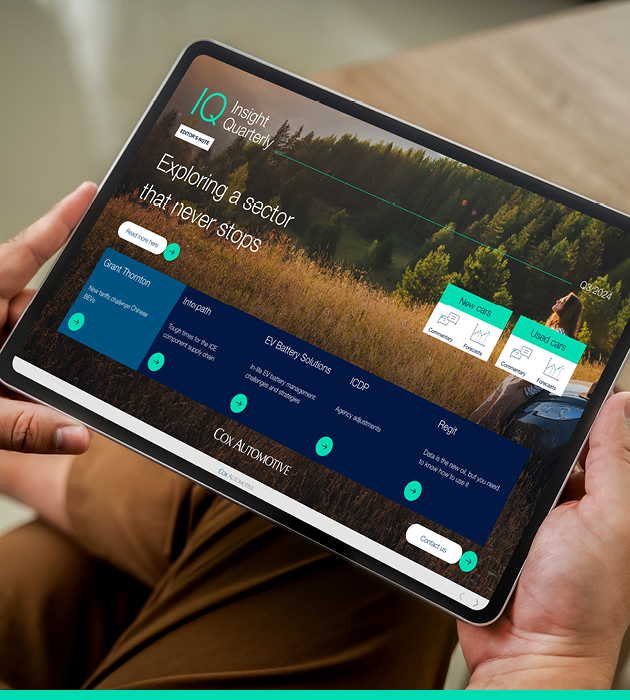Helping you stay informed about the industry’s most important trends & topics.
Discover Insight Quarterly.
Last October, family-owned Swansway Motor Group signed a new, two-year contract, beginning a solus remarketing partnership with Cox Automotive product brand Manheim Auction Services. We caught up with directors Peter and John Smyth to get the inside story on their move to Manheim and how their business is evolving to meet new demand and opportunity.

With more than 20 car and van dealerships located across the North West, Midlands, and Wales, Swansway Motor Group represents manufacturers including Audi, Jaguar, Honda, Land Rover, Peugeot, SEAT, Volkswagen, and Volkswagen Commercial Vehicles. It also runs a repair centre and a non-franchise used car division, Motor Match. Brothers Peter, David and John Smyth, along with their father Michael, founded the group in 2003, but the roots of the family’s involvement with the motor trade date back much earlier.
“My mother and father founded RRG, Radcliffe Road Garage, in 1967,” explains Peter Smyth. “The business grew to include one of the busiest petrol stations in the UK and Europe’s largest Toyota dealer group before they sold it in 2000. Retirement didn’t interest my father though, so together, we acquired a dealership group in Cheshire called LC Charles. That was the starting point for the Swansway Motor Group which you see today.”
“We now employ around 1,200 people across more than 20 sites. We’re completely family owned and private, and we are a profitable entity, turning over around £838.5m in 2021, and achieving a pre-tax profit of £25.2m. Next year we’ll be 20 years old. We’ve got a strong balance sheet and are in a fantastic position to keep moving forward. There’re changes ahead of us all in the motor retail sector and we’re well placed to adapt however we need to.”
Moving to Manheim
With Swansway retailing just shy of 25,000 new and used vehicles a year, an efficient and commercially-minded remarketing operation is an important contributor to the bottom line. While a large proportion of part-ex vehicles are retained either within the group’s franchised dealers or retailed through its Motor Match business, around 3,000 per year are sent to auction.
The group’s move to Cox Automotive and Manheim was a consequence of their previous provider, BCA, diversifying into the retail sector. John Smyth explains: “We were happy with the performance we were getting through BCA and had a good relationship with the team we dealt with day-to-day but had become increasingly concerned about their overall strategy. The launch of Cinch forced us to review; we didn’t feel it in our interests to feed our competition cars.”
Change does not come without risk and the Smyths admit despite being satisfied with their decision and the terms agreed with Cox Automotive, they were nervous that change would bring disruption and a decline in performance. But, as Peter Smyth explains, that concern has proved unwarranted.
“We had initially been concerned about whether we’d have to rebuild the trade demand, whether the values achieved would be the same, how much time it would take to train up our people to use new systems, and getting sales in the right locations and on the right days. But the Cox Automotive team have been superb, working closely with our own head office and dealer teams and since the changeover, the figures have been strong and the experience very positive.”
Working with the right partners is important as John comments: “As a family business, and proudly so, we like the fact we’re also dealing with a family business in Cox Automotive. Our business is all about ‘caring for your customers, caring for your fellow staff members, and being proud of what you do’, which aligns nicely with the Cox Automotive value of ‘always do the right thing’ and its commitment to leave the world in a better place for the next generation. We look forward to seeing where this partnership takes us.”
Local autonomy
Another area which Peter and John are particularly passionate about is the need for sales managers within their network to retain autonomy and be able to make decisions. With this in mind, the business is making use of Cox Automotive’s eVA valuation, appraisal and car buying solutions tool.
Peter explains how this works in practice: “A lot of our competitors set prices on behalf of their dealers, so the sales managers don’t get a chance to make their own decisions. But we don’t want to set everything from head office because we’re not the experts on the ground and dictating everything removes any opportunity to be entrepreneurial. We provide information and advice, guiding people on the most effective price to buy or sell a car, but we empower our managers to make their own decisions and tools like eVA help them. We’re looking for healthy internal competition and collaboration between our franchise and Motor Match managers to get the best outcome for the business.”
Securing part-exchanges is important to Swansway, not just because the business retains in the region of 80% its dealership part-ex stock for retail, but because securing the part-ex is integral to securing the customer full stop.
“If a customer sells their car to one of the buying services, the odds are, that customer is lost. And that means we don’t just lose the opportunity to sell them a car, but also the opportunity to sell their part-ex and the opportunity to retain that customer over the long term. Giving our teams the tools to help them create a really competitive part-ex proposition is therefore something we take seriously. With eVA, we’re also able to let our customers get an accurate evaluation before they come to one of our showrooms. With more of the shopping journey being done online, this is really valuable.”
John adds that the team had initially expected customer self-appraisals to be on the high side, with people putting showroom condition when their vehicle actually had wear and tear or even damage. However, he and the team have noted that most customers actually list their vehicle as being of average condition to determine the valuation. That means, he says, that the conversations with the customer when they come to complete their part-exchange are much more pleasant.
Looking to the future
Swansway Motor Group is seeing a rapid increase in online engagement, with a 65% increase in website traffic between 2020 and 2021 as well as a 70% increase in online enquiries, and almost 40% increase in online transactions. The business is also gearing up for the transition to electric vehicles, investing in new and used vehicle aftersales activity and exploring additional revenue streams to make up for electric vehicles’ reduced maintenance requirements.
In response to the market conditions of the past few years, as well as the upcoming changes anticipated because of the agency model, Swansway Motor Group has turned its attentions to the used car sector. While the non-franchised used car Motor Match brand has been around for more than five years now, its impact has been felt much more in recent times and the group has invested heavily in its expansion.
John explains: “We started Motor Match to bring in additional revenue streams for some of our dealerships and to take advantage of the opportunity to retail part-ex stock. Initially, we thought we might sell around 25 cars a month through the brand. However, we’re now transacting around 400 to 500 cars a month because we’ve changed the way we do business and focused on developing the proposition.”
Peter adds: “When a customer buys from one of our franchised Swansway Motor Group dealerships, they expect and receive a premium customer experience. What Motor Match provides is good quality used stock and a focus on customer experience but at a slightly more value price point. The customer knows they are buying a used car and it won’t necessarily be perfect, but they are happy because the reality matches the anticipation.”
In recent years, the business has shifted from a 1:1 used to new ratio, to a 2:1 mix, excluding fleet and agency units. Many of the vehicles which are retailed through Motor Match come from part-exchanges taken in across the group. Ideal vehicles for the Motor Match proposition tend to retail at around £14-20,000, with up to 60,000 miles on the clock.
A further key change the Smyths are evaluating is the potential impact the agency model might have on their turnover, profits, and business model. Peter comments: “While we can certainly understand why the manufacturers may want to have more centralised control over new vehicle pricing, and a stronger regional focus for dealers who will be marketing and selling vehicles within their predetermined area of influence, we’re not sure this is what the customer necessarily wants.”
He continues: “We know, for example, that customers are willing and able to travel cross-country to get the vehicle they want, at the time they need it, and at a price that is competitive. Increased digitalisation also means customers can complete most, if not all, of their research from home and access stock from a variety of locations. Manufacturers clearly need to recoup the high costs of shifting to electric vehicles, but the agency model will have a significant impact on the new car market, while we expect to see demand remain high for used cars for some time yet.”
Start your journey
We’re transforming the operations of the world’s leading automotive brands. Get in touch to find out how.




